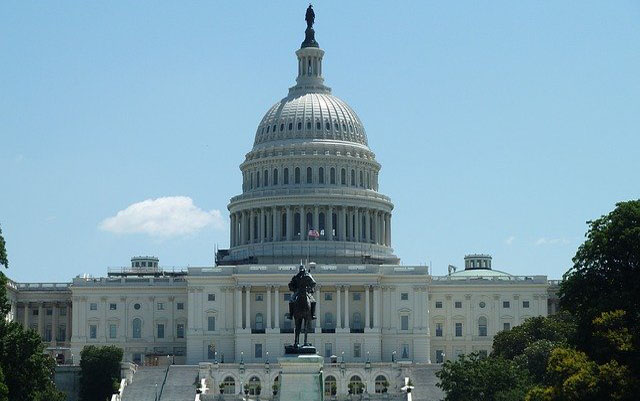Last week, the House passed an historic bill to decriminalize cannabis at the federal level. Despite growing public and political support for such a measure, the bill has little chance of succeeding in the Senate where Republicans—even those who want to end federal cannabis prohibition—will object to the bill as going too far in other ways. Meanwhile, Democrats don’t support bills favored by Republicans, because they don’t go far enough. Unless the sides compromise, they may end with a situation that satisfies neither – and citizens will remain trapped in the crossfire between conflicting state and federal cannabis laws.
The people themselves have spoken. Most Americans want cannabis legalized, with an even greater portion thinking the choice should be left to states. In the last election, ever single cannabis liberalization measure passed. Even voters in deep-red Mississippi voted to legalize medical marijuana, bringing the total number of states with some form of legal cannabis to 35 plus Washington, D.C. These changes in state law reflect changing public opinion.
Federal lawmakers have been far less accommodating. Despite considering dozens of cannabis-related bills over the years, the House-passed Marijuana Opportunity Reinvestment and Expungement (MORE) is the first to receive a vote by either chamber. Sponsored by Rep. Jerry Nadler (D-NY), the MORE Act would de-schedule cannabis from federal drug laws, allowing the states to decide if and how to regulate the substance. It would also allow legitimate cannabis businesses access to the same rights and federal benefits as other industries and protect cannabis consumers from discrimination or prosecution arising from the federal prohibition. Many Republicans support such efforts.
A competing bill, the Strengthening the Tenth Amendment through Entrusting the States (STATES) Act of 2019, had true bipartisan support. Of the 65 house co-sponsors, 20 were Republicans. Of the 9 co-sponsors in the Senate, 5 were Republicans. But, unlike the MORE Act, though, the STATES Act would neither fully de-schedule cannabis nor take any action to undo the harms caused by cannabis prohibition. This narrow focus is what allowed liberty-minded Republicans to support it and gave the bill a good chance of succeeding in both chambers. It’s also why Democrats, who favor a broader approach, let the bill stall in the House. Hence, the MORE Act’s success.
In addition to federally decriminalizing cannabis, the MORE Act would establish a process to expunge federal convictions for certain cannabis offenses. It also institutes a 5 percent tax on cannabis products, directing revenue to programs aimed at supporting communities, businesses, and individuals impacted by the drug war. While Republicans may not take issue with record expungement and may even be open to certain action aimed at addressing inequities created by prohibition, they will certainly object to the creation of a new federal tax. For most Republicans, this is a poison pill, making the bill dead on arrival in Senate.
Democrats know this. They also know the incoming Biden administration is unlikely to solve the problem by executive action. Only Congress can resolve the situation and, until they do, individuals and businesses will continue to face threats posed by the opposing state and federal treatment of cannabis. Because cannabis is federally prohibited, small state-authorized cannabis businesses are excluded from many financial and legal services afforded to other industries. For example, because federally regulated banks are reticent to service a federally prohibited industry, most cannabis businesses are forced to rely on cash transactions, making them targets for criminals. These same companies, while paying federal taxes, may not deduct business costs and are excluded from loans offered by the Small Business Administration. Cannabis users, meanwhile, face legal hazards that extend to issues of employment, housing, property rights, firearms purchasing, and civil asset forfeiture even if they buy and use cannabis in states where it is legal. Thanks to the Gun Control Act of 1968, anyone participating in state medical marijuana programs may not legally possess guns or ammunition. Because the federal prohibition bars the Department of Veterans Affairs from prescribe medical marijuana, many veterans who wish to use cannabis for anxiety or PTSD are often forced to obtain it illegally.
A week after the House approved the MORE Act, the Senate—still under Republican control—passed a bill that would loosen rules on cannabis research and clarifies that federal law doesn’t prohibit physicians from discussing the risks and benefits of cannabis use with patients. While obviously very limited in scope, this demonstrates that Republicans are willing to work with their Democratic colleagues on changing federal cannabis laws. But, resolving the problem of federal prohibition will require compromise on both sides.
A bill that perfectly suits one party has virtually no chance of becoming law. But if the parties can work together on a more limited approach, they may be able to settle on something that both can endorse: a measure that fully decriminalizes cannabis at the federal level but leaves questions about taxes and social justice for another day. Such a solution may not be politically “perfect,” but it would restore power to the states and protect citizens caught in the crossfire between federal prohibition and state legalization. And that should be more important to lawmakers than getting exactly what they want.







The political parties in Congress could agree to reconstruct the definition of marijuana to make it uphold the Constitution. Would it actually require a compromise to make the definition uphold the Constitution? Are the politics so koyaanisqatsi that the party members would struggle to agree to reform a single federal law to make it uphold the Constitution? If the lawmakers can’t do that, then who needs them? Since we have to wait two years for the next election, we should contact them about reconstructing the definition, or else “NO Vote For You!”.
Since 1937, each federal definition of “marihuana” has been persistently malformed by the same features of racism, duplicity, and circumlocution – neither of which is a “necessary and proper” feature of federal law. Reconstructing the definition in the necessary and proper way to remove those features will make it literally uphold the Constitution.
The features of racism, duplicity, and circumlocution can be removed by unambiguously describing how “marijuana” is actually derived from every cannabis plant that is included under the archetypal designation of Cannabis sativa L., and by specifying the federal prohibitions of cannabis use that codify the original intent, common sense, context, and promise of the 2nd, 4th, 9th, 10th, and 14th Amendments. That will reconstruct the definition to conclusively uphold the Constitution, so states will be disencumbered to make fair laws to control the use of carefully descheduled cannabis plants by their citizens of voting age, whose ratified liberty rights to grow, conduct commerce, and use cannabis will be lawfully restored, and protected by the Supremacy Clause, like this:
(21 U.S.C. 802(16)) The term “marijuana” means all parts of the smoke produced by the combustion of the plant Cannabis sativa L., which is, as are the viable seeds of such plant, prohibited to be grown by or sold by any publicly traded corporation or subsidiary company, and such smoke is prohibited to be inhaled by any child or by any person bearing any firearm, as is their intake of any part or any product of such plant containing more than 0.3% THC by weight unless prescribed to such child by an authorized medical practitioner.
(92 words)
Compare the accuracy and controls in the reconstructed definition to the habitual features of racism, duplicity, and circumlocution that have malformed the current federal definition:
(21 U.S.C. 802(16))(A) Subject to subparagraph (B), the term “marihuana” means all parts of the plant Cannabis sativa L., whether growing or not; the seeds thereof; the resin extracted from any part of such plant; and every compound, manufacture, salt, derivative, mixture, or preparation of such plant, its seeds or resin.
(B) The term “marihuana” does not include (i) hemp, as defined in section 1639o of title 7; or (ii) the mature stalks of such plant, fiber produced from such stalks, oil or cake made from the seeds of such plant, any other compound, manufacture, salt, derivative, mixture, or preparation of such mature stalks (except the resin extracted therefrom), fiber, oil, or cake, or the sterilized seed of such plant which is incapable of germination.
(122 words)
We should contact our members of Congress about reconstructing the definition to make it uphold our Constitution. That will carefully deschedule cannabis plants, and make it easier to separately remove marijuana itself from Schedule 1 by reconsidering its adulterated medical value.